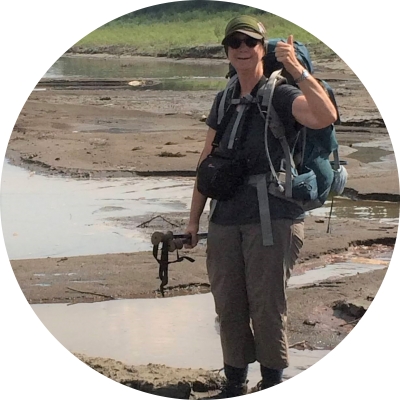Debbie DeLancey
Education: Master of Assessment and Evaluation
Home organization: Governing Council Member, Canadian Institutes of Health Research
Research statement:
My work with NWT Indigenous organizations and communities began in the mid-1970’s working with the Dene Nation to coalesce support across southern Canada in opposition to the Mackenzie Valley pipeline project; and over the next decade included community development work for the Inuit Tapirisat of Canada which led to the establishment of the Inuit Broadcasting Corporation; leading the Dene Nation’s socio-economic research to support interventions for environmental assessment processes; and working with the Fort Good Hope Dene Community Council to operate a research and consulting entity focusing on community-based research and Indigenous knowledge.
During more than 25 years working at senior levels in a variety of departments for the Government of the Northwest Territories I developed an interest in the need for evidence-informed decision-making to inform program and policy design, to ensure that government initiatives were responsive to the needs of NWT residents and to determine whether results were being achieved. My research focus is on evaluation, its potential to improve effectiveness of program delivery by all levels of government in the NWT, and particularly the need for culturally appropriate and Indigenous-led evaluation approaches to inform the design and delivery of programs by and for Indigenous peoples.
Description of research program in the NWT:
I am a Fellow of the Canadian Evaluation Society, working with Governing Council Member, Canadian Institutes of Health Research, to promote and develop capacity for Indigenous evaluation of health and health-related programming in the NWT. My specific research interest is exploring the potential to develop collaborative evaluation approaches for Indigenous on-the-land programs, grounded in Indigenous values and methods with results that are relevant to Indigenous governments and communities, but also provide compelling evidence of program effectiveness for non-Indigenous government funders and philanthropic funders.
Scientific Contributions:
1. DeLancey, D. 2019. Indigenous Evaluation in the Northwest Territories: Opportunities and Challenges. Canadian Journal of Program Evaluation 34: 492-512. doi: 10.3138/cjpe.68837
2. DeLancey, D. 2019. Introduction to Articles Prepared by CES Calgary 2018 Keynote Panel Members on Reconciliation and Culturally Responsive Evaluation – Rhetoric or Reality? Canadian Journal of Program Evaluation 34: 329-330. doi: 10.3138/cjpe.67979
3. DeLancey, D. Changing the System: Improving Indigenous Health Outcomes in NWT through Policy and Practice. (forthcoming). Northern Public Affairs. (accepted for publication).
4. Kerber, K., Kolahdooz, F., Otway, M., Laboucan, M., Jang, S.L., Lawrence, S., Aronyk, S., Quinn, M., Irlbacher-Fox, S., Milligan, C., Broadhead, S., DeLancey, D., Corriveau, A., Sharma, S. (2019). Opportunities for improving patient experiences among medical travelers from Canada’s far north; a mixed-methods study. BMJ Open 2019, 9:e030885, doi:10.1136/bmjopen-2019-030885.
5. DeLancey, D., Radu, I.,Enosse, L. and Ritchie, S. (2018). Measuring Connection: Evaluating Land-Based Programs. Northern Public Affairs: Vol. 6, Special Issue #1. 2018: p. 39-44.

